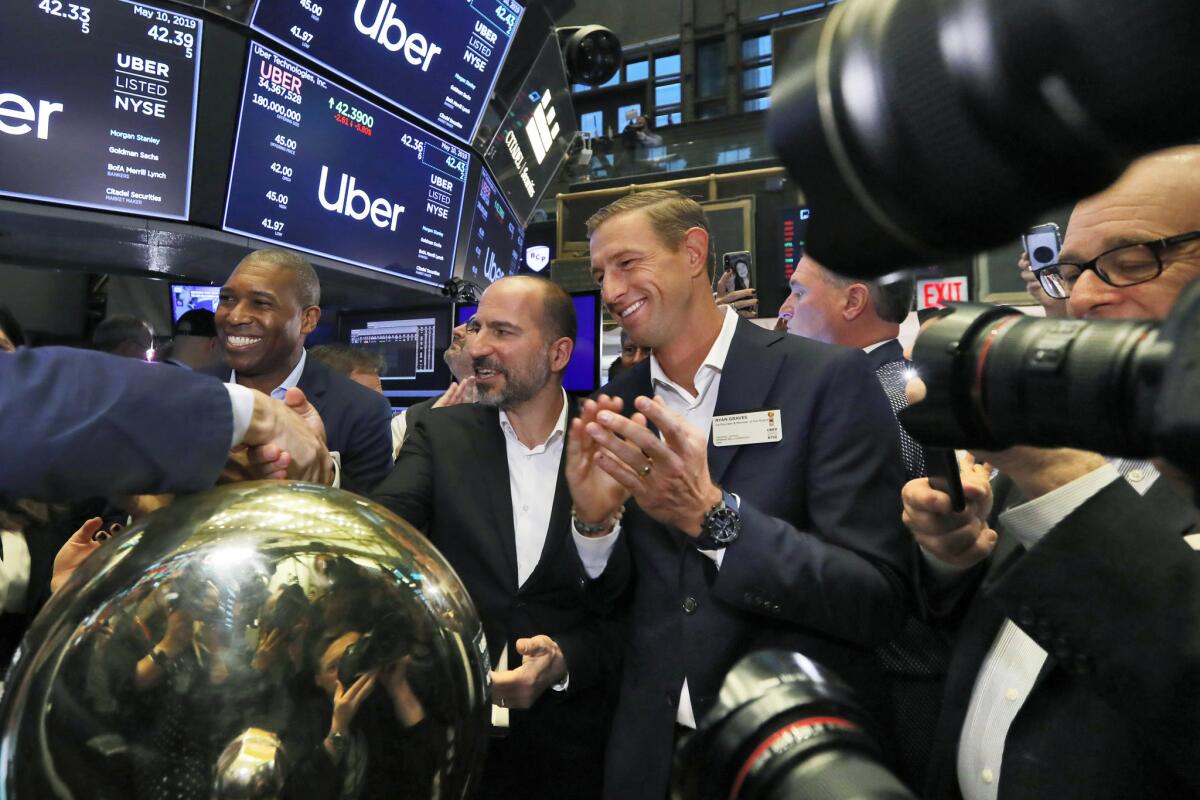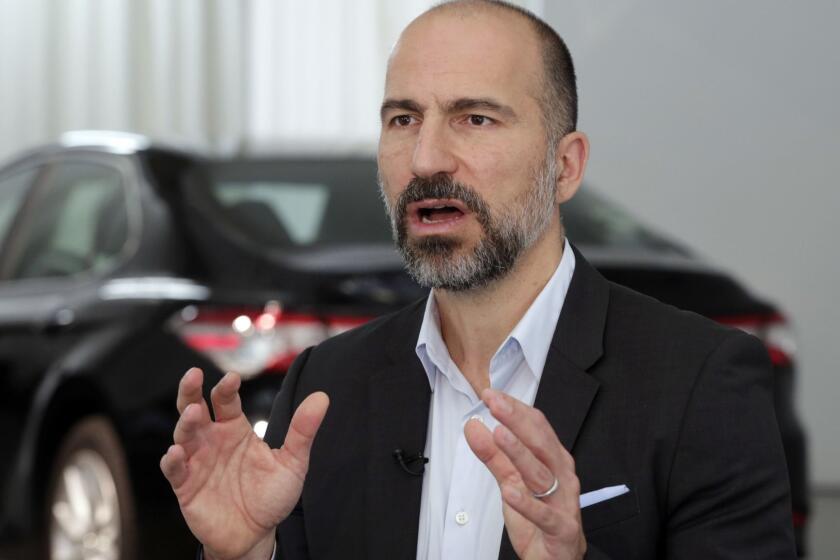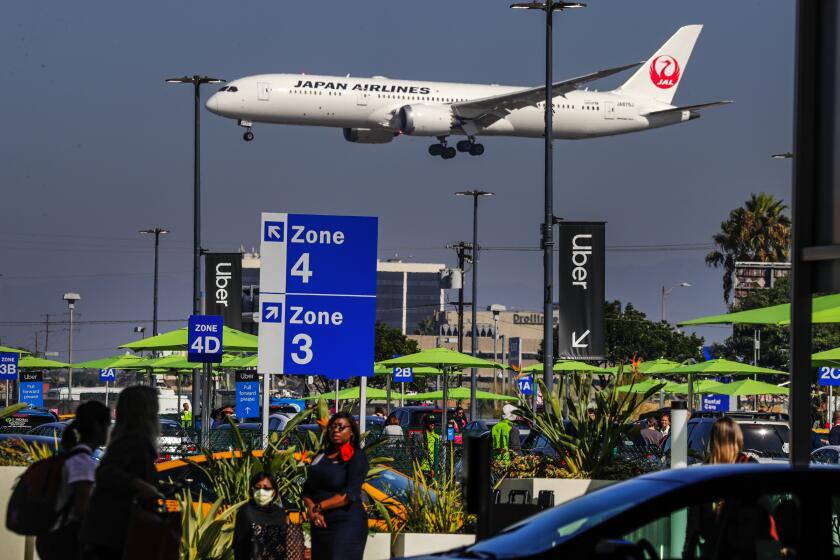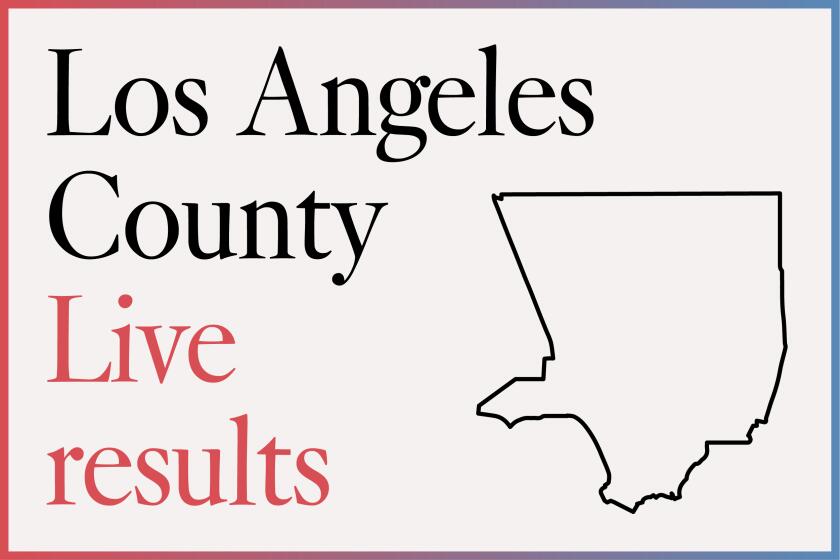Column: With Prop. 22, Uber and Lyft used their wealth to reshape labor law in their sole interest

- Share via
California’s ballot initiative system once again proved its value in this election cycle — to anyone with hundreds of millions of dollars to spend, that is.
Step forward, Uber and Lyft.
The two big ride-hailing companies, along with a few other gig-economy firms, spent $205 million to pass Proposition 22 on the California ballot.
We may not be able to achieve or maintain profitability in the near term...or at all.
— Uber discloses its bottom line
The measure exempts them from AB 5, the state law that required them to treat their drivers and other field workers as employees rather than independent contractors.
Make no mistake: This is a revolutionary step in the influence of tech-based businesses in our daily lives in general and the lives of workers in particular.
These companies gained a foothold in the transportation market by exploiting a loophole in labor law; then when the loophole was closed, they deployed their wealth —much of it fronted them by venture investors prior to their stock offerings — to open it up again, this time in a way that looks insurmountable. Not only does the public interest lose out, but so does the working class, which can be ground down by the companies’ redefinition of “work,” to their own benefit.
The work environment may never be the same, in not a good way at all.
The bottom line is that these money-losing companies secured themselves the latitude to keep scratching after elusive profits by exploiting workers by sticking them with expenses including fuel, vehicle upkeep and insurance, while denying them compensation and unemployment benefits, the assurance of a living wage and the right to unionize.
Even worse, they immunized themselves from legislative oversight by writing in a provision requiring a seven-eighths vote of the membership of both legislative chambers to alter Proposition 22. That’s an almost insurmountable threshold.
This effort is widely described as having made the Proposition 22 campaign the most expensive in California history. This is incorrect. It’s the most expensive in American history.
The Proposition 22 ballot campaign by Uber and Lyft just became the most expensive such campaign ever.
What it tells us is that the California initiative process is irremediably broken.
Devised in 1911 by then-Gov. Hiram Johnson, a progressive Republican, as a counterweight to the stifling political power of the Southern Pacific Railroad, the process is now largely a cat’s paw of business interests, who wield it to fight the popular will as expressed through the legislature.
One might defend this as merely giving voters an alternative way of expressing their intentions, but that would be wrong. Enactments of major bills by the legislature involve public hearings, professional analysis and open debate. This process is not always perfect. But on the other side, making law via ballot initiatives involves only money.
As in the case of Proposition 22, it’s self-interested money, spent on a staggering scale. How is the money spent? Uber, Lyft, Doordash, Instacart and Postmates, the chief contributors, spent it on glossy television commercials notable for their deceptiveness, and on harassing and smearing a critic.
To put it bluntly, these companies spent $205 million to carve out a private law that benefits only themselves. Opponents, mostly labor unions, assembled a war chest of merely $20 million.
Proposition 22 wasn’t the only measure on this year’s ballot to attract big corporate spending. Proposition 23, which would have tightened regulations on dialysis clinics, failed after the two dominant companies in the field, DaVita and Fresenius, spent a combined $97 million to kill it. (Other dialysis companies brought the total to more than $105 million.)
And the international insurance companies that are the secret backers of California’s cash bail system, spent more than $9 million to overturn a state law that would eliminate that system. As we write, their effort to preserve their business is leading, though inconclusively.
The bail industry will spend lavishly to pass a self-interested ballot measure in 2020. Don’t bite.
Property management firms, business lobbies and real estate developers contributed more than $50 million to defeat Proposition 15, which would have created a “split roll” to allow more frequent assessments of commercial and industrial property.
The measure, which was narrowly behind in the voting count early Wednesday, would have amended Proposition 13, which has disadvantaged homeowners in relation to other property owners since its enactment in 1978.
For all that, it’s Proposition 22 that will stand as a model for corporate interests looking to overcome legitimate regulations at the state level and inoculate their handiwork from the legislature. So let’s take a closer look at the measure’s backers and ramifications.
Uber and Lyft, the only companies among the initiative’s backers that are publicly traded and therefore disclose their financial results, are money-losers on a grand scale.
Uber lost $4.7 billion on revenue of $5.8 billion in the first half of 2020 ended June 30, on top of a loss of $8.5 billion on $14.1 billion in revenue during 2019. Lyft lost $835 million on revenue of $1.3 billion in the first half of 2020, after losing $2.6 billion on revenue of $3.6 billion last year.
Both companies asserted in public statements that they saw AB 5 as an existential threat. Even while paying workers no benefits and shouldering them with the costs of work, Uber said in its most recent quarterly report, “we may not be able to achieve or maintain profitability in the near term ... or at all.”
Being forced to classify its drivers as employees, the company added, “would require us to fundamentally change our business model, and consequently have an adverse effect on our business and financial condition.”
The two transportation companies made clear how seriously they took this threat earlier this year, when they both threatened to leave California after a state court judge ruled that they had to reclassify their drivers as employees under AB 5.
The ballot box campaign funded by Uber and Lyft is harassing a California law professor.
The judge’s ruling was upheld by an appeals court on Oct. 22, but obviously the court action is now moot. In any case, the companies’ threat to flee California was best regarded as a bluff, since San Francisco and Los Angeles are among their most important markets in the world.
The companies’ advertising campaign for Proposition 22 bristled with misrepresentations and disinformation. They featured testimonials from drivers asserting in effect that the initiative was all that stood between them and the penury that would result from their losing their ability to drive for the companies.
In fact, as we’ve reported, all drivers aren’t created equal. The vast majority of their drivers are part-timers who drive as a side gig, record minimal hours, and tend to give up within six months of starting.
A large minority, however, are tantamount to full-time workers — they may spend 40 to 50 hours a week on the road and account for more than half of all the hours worked through the companies’ apps. They also tend to be the drivers who most value the opportunity to be treated as employees, not contractors.
The ad campaign didn’t make clear the distinction between the camps. The benefits of Proposition 22 touted by the drivers features in the ads, however, tended to be those that would be appreciated by part-timers — “the flexibility of working when I want,” for example.
Uber and Lyft are being squeezed by enforcement of California’s gig worker law.
Uber and Lyft touted the ostensible benefits for drivers offered by Proposition 22, such as a guarantee of at least 120% of the minimum wage plus 30 cents per mile to cover expenses, as well as access to health insurance. (That wage guarantee would come to $15.60 after the state minimum wage rises to $13 an hour on Jan. 1.)
But those benefits are largely illusory. As Ken Jacobs and Michael Reich of the UC Berkeley Labor Center have pointed out, the $15.60 minimum shrinks to only $5.64 when conditions and specifics are factored in. Among other hidden particularities, the guarantee only applies when drivers are on the way to picking up a passenger or have a passenger in the car — which comes to only 67% of an average driver’s work time.
None of the costs incurred while drivers are waiting or cruising would be covered by the 30-cent mileage payout, which in any event falls well below the IRS standard cost estimate of 58 cents per mile.
As for the health plan stipend in Proposition 22 — $367 per month, calculated as the average employer contribution toward a Covered California health plan — Jacobs and Reich reckon that the vast majority of drivers won’t qualify for it.
The full payment would be made only to drivers notching 25 hours per week over a calendar quarter, and drivers averaging 15 to 25 hours per week would receive half as much. Those driving fewer than 15 hours would receive nothing.
Uber and Lyft have upended the worker-employer relationship by aggressively flouting local and state labor laws and safety rules and challenging overmatched local officials to fight them.
In California, this strategy met its match in AB 5, so the companies took another tack — they spent $205 million to rewrite the law for their own gain by inundating California voters with deceit.
This is exactly the opposite of how the initiative process was supposed to work. Hiram Johnson must be rolling over in his grave.
More to Read
Inside the business of entertainment
The Wide Shot brings you news, analysis and insights on everything from streaming wars to production — and what it all means for the future.
You may occasionally receive promotional content from the Los Angeles Times.















